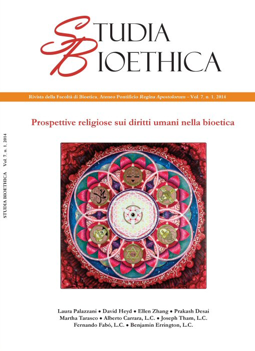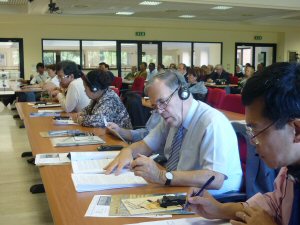Second International Bioethics, Multiculturalism and Religion Workshop and Conference on Human Vulnerability
Rome, Italy, October 9-11, 2011
With the advance of biomedicine, certain individuals and groups are vulnerable because of their incapacities to defend themselves. Many world religions include the protection of the weak, underprivileged and the poor as part of their mission.
In light of the need to deepen our understanding of the principle of human vulnerability and personal integrity, this meeting will consist in a three-day workshop where bioethics experts from major world religions—Judaism, Islam, Christianity, Confucianism, Buddhism, and Hinduism—to discuss the meaning and implications of this principle in their traditions.
History
The first series of “Bioethics, Multiculturalism and Religion” conferences was held in Jerusalem on December 13-14, 2009. The conferences sought to foster the art of convergence and cooperation in global ethics among experts in bioethics coming from the three monotheistic religions—Judaism, Christianity and Islam.
Second International Workshop and Conference on “Human Vulnerability”
Article 8 of the UNESCO Declaration on Bioethics and Human Rights (2005) states: “In applying and advancing scientific knowledge, medical practice and associated technologies, human vulnerability should be taken into account. Individuals and groups of special vulnerability should be protected and the personal integrity of such individuals respected.”
With the advance of biomedicine, certain individuals and groups are vulnerable because of their incapacities to defend themselves. The International Bioethics Committee as a UNESCO working group has for the last several years dedicated to deepen this principle of human vulnerability and personal integrity. We wish to supplement this effort with a religious perspective, since a great number of the world’s population is affiliated with some religious traditions. While we recognize the existence of diversity within each of these traditions, all of them carry in them the mission to protect the weak, the underprivileged and the poor.
This meeting will consist in a two-day workshop where bioethics experts from six major world religions—Buddhism, Christianity, Confucianism, Hinduism, Islam, and Judaism—gather to discuss the meaning and implications of this principle in their respective traditions. The third day would be an open conference for the public.
The collection of these papers will result in the publication of a book.
Methodology
Each religious group will be commissioned to write (approx. 10-page) papers that must be submitted on September 1, 2011, about a month before the workshop.
The follow papers will be commissioned:
Each of the six religious groups will write a paper addressing:
- Anthropology of vulnerability (e.g., questions on human contingency, suffering and mortality)
- Ethics of vulnerability (e.g., respect, compassion /mercy, charity / love)
- Legal aspects of vulnerability (religious and civil)
Each of the six religious groups will write a paper addressing certain groups who are especially vulnerable and how they are perceived and attended to in their respective religious traditions:
- Children before and after birth
- Women
- Physically and mentally handicapped
- The elderly
The workshop will be held on October 9-11, 2011 in Rome. The language of the workshop is English. Participants of the workshop include:
- Experts from the six religions who have written and submitted the papers. They are expected to have read all the other papers before attending the workshop. During each workshop session, they will give a 10 minute summary of their papers followed by an ample period of discussion, clarification, questions and critiques of these papers.
- Academics who are interested in the topic may participate in the workshop once approved by the organizing committee (Send requests to jtham@unescobiochair.org). They would need to have read the papers of the group in order to fruitfully engage in the discussions. Priority is given to discussions in group a).
- Other academics interested in the workshop who have not read the papers may also participate in the sessions, after approval by the organizing committee. (Send requests to jtham@unescobiochair.org) They can raise questions only after the above two groups have exhausted the discussions.
It is hoped that these discussions will provide a clear and thorough understanding of each religious tradition on their understanding of vulnerability. Their papers may also be modified based on this dialog before submission for eventual publication. It is hoped that some common ideals and visions on vulnerability will emerge from the different religious traditions.
Organizing committee
Alberto Garcia, Director of the UNESCO Chair in Bioethics and Human Rights
Gonzalo Miranda, LC, Fellow of the UNESCO Chair
Joseph Tham, LC, Fellow of the UNESCO Chair
Academic coordinator
Joseph Tham, LC jtham@unescobiochair.org
Advisory Board
Mustafa Abu Sway, Al Quds University, Jerusalem.
Ricardo di Segni, Chief Rabbi of Rome.
Colleen Gallagher, University of Texas MD Anderson Cancer Center, Houston.
Christian Hervé, Université René Descartes, Paris.
Ping Cheung Lo, Hong Kong Baptist University, Hong Kong.
Henk Ten Have, Duquesne University, Pittsburg.
Stamatios Tzitzis, Université Panthéon Assas Paris II, Paris.





 There are, however, certain trends that can be detected across the board. There isrecognition of our human condition with its limitations that calls for a response in all religions, albeit with different names: Mercy (hesed) in Judaism, Agape for Christians, Humaneness (ren) in Confucianism, and Compassion in Buddhism, etc.
There are, however, certain trends that can be detected across the board. There isrecognition of our human condition with its limitations that calls for a response in all religions, albeit with different names: Mercy (hesed) in Judaism, Agape for Christians, Humaneness (ren) in Confucianism, and Compassion in Buddhism, etc.